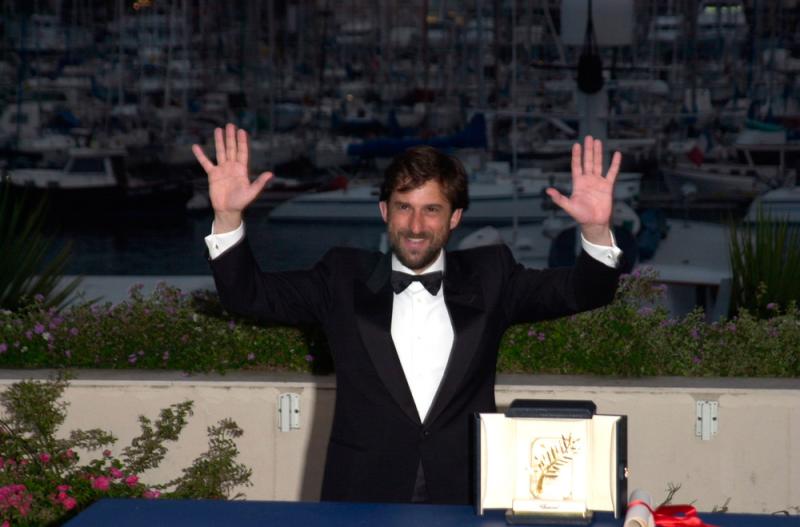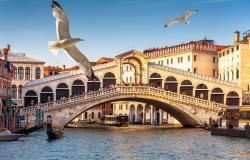Born to Roman parents in 1953, Nanni Moretti is one of the few Italian directors after Federico Fellini whose name has risen to adjectival status. If there’s such a thing as a “Fellinian Rome,” there’s also a Morettian Italy, and it’s an Italy that is self-conscious, satirical, absurd, at times heartwarming and always full of personality.
Moretti’s latest feature, Il Sol dell’Avvenire — “A Brighter Tomorrow” in English — is in the running for the Palme d’Or, or the highest honor at the Cannes Film Festival, which this year runs from May 16 to 27. Critics are celebrating the new film as a return to classic morettiano form, with the trademarks of the idiosyncratic director on full show.
Moretti’s unique brand of auteur cinema grew out of sociopolitical satire and generous high comedy, with his 1976 feature film debut Io sono un autarchico (“I Am Self-Sufficient”) growing in popularity over the decades to become a cult classic.
Since then, some clear staples of Moretti’s cinema have emerged and remained, but in myriad combinations: There’s his dynamic presence as an actor (and favorite protagonist); a jovially ironic style that tackles serious issues with the lightest touch; and a seeming fascination with sports, perhaps coming from his childhood love of water polo, which he manages to relate to the deepest of existential questions. (Those, of course, are often left unresolved.)
It's not at all necessary to know Moretti’s back catalog to enjoy Il Sol del’Avvenire, but now is an excellent time to explore what makes Moretti special in Italian cinema. You’ll likely find that he delights and comforts as much as he questions the foundations of Italy — and of life itself — with a razor-sharp edge.
Ecce Bombo (1978)
When looking back on the success of Ecce Bombo, his second feature-length film, Moretti once reflected glibly, “If it had done badly, we would have blamed the name.”
A version of the biblical “Ecce homo” for the turbulent 1970s in Italy, this “serious film for the few” would later become more of a “comic film for everybody.” It centers on Moretti’s alter ego, university student Michele, and his good-natured but often directionless friends in a middle-class neighborhood of Rome, who together decide to start holding “consciousness-raising meetings.”
At its core, Ecce Bombo is an absurdist comedy, but it touches on something deeply puzzling for the post-1968 generation, perhaps best captured in a comment made by Michele’s friend Mirko after a long string of monologues from his friends: “I think that we’re wrong about nearly everything: in our relationships with women, among ourselves, with study, with our family, with work.” It’s a key scene of existentialist limbo in which Michele and his friends wait for the sunrise on the beach at Ostia, only to realize they’ve missed it when they wake to a man screaming “Ecce bombo!” as he cycles by them.
Using a low-budget ensemble and naturalistic visuals, Moretti’s talent for dialogue shines through, as does his perfect timing, comic flair and an overarching resistance to middle-class apathy. A wonderful first-taste of Moretti, Ecce Bombo could be compared to Fellini’s I Vitelloni for the tail-end of Italy’s student activism. Moretti, as Michele, yells the implicit insult “You deserve Alberto Sordi!” to a pontificating bourgeois Roman at a café in one of its many quotable lines.
Caro Diario/Dear Diary (1993)
For many fans, Caro Diario is quintessential Moretti. A semi-autobiographical documentary divided into three “chapters” within Moretti’s pseudo-diary, the film follows the director on his Vespa through Rome, exuding cinematic joy.
Early scenes feature Moretti dancing to a Silvana Mangano song that plays from a tiny TV in a neighborhood bar. On the trusty Vespa, he then travels to Ostia to revisit the place where Pier Paolo Pasolini was killed. Early bite-sized vignettes give way to several episodes of his journey south towards the Aeolian Islands, as “director Moretti” searches for some peace and refuge from the consumption-focused society that Pasolini feared was taking over Italy.
From there, the plot takes a spider’s path, with Moretti seeking greater and greater isolation, culminating with his friend Gerardo, a Joyce scholar who claims to never watch TV, becoming addicted to soap operas and running for the mainland and away from his principles.
The final third of this gem of a film is dedicated to a true story of absurdity in medicine in which Moretti turns to doctors and psychologists to solve his ills — a recurring motif in his thinking cinema.
La stanza del Figlio/The Son’s Room (2001)
This heartfelt tale about a family grappling with the death of their 17-year-old son and brother, Andrea, stars Laura Morante and Jasmine Trinca as a grieving mother and sister, respectively, alongside Moretti as the father, Giovanni. In La stanza del figlio’s opening sequence, we see a more mature Moretti returning from a jog and pausing to listen to singing worshippers on the street. The film is full of such poignant moments and small epiphanies that lend meaning and connection to a chaotic world.
The film focuses on a family’s quiet moments of connection in the lead up to the arrival of Arianna, a girl with whom Andrea exchanged letters after meeting at camp. As Giovanni — a psychiatrist who struggles to stay in the profession after the devastating loss — Moretti gives us a vision of life made worthwhile through small acts, with a powerful message about accepting life’s absurdities alongside its joys. The film was an arthouse hit and earned Moretti the Palme d’Or and the David di Donatello for Best Film.
Tip: To fully appreciate the gentle pacing of the film even after it’s over, listen to the soundtrack by composer Nicola Piovani as the storyline lingers with you.
Habemus Papam/We Have a Pope (2011)
The brash premise of this hybrid comedy-psychological drama speaks for itself: When the Pope dies, a new one must be elected by the cardinals and the world waits with bated breath for white smoke to rise from St. Peter’s Basilica announcing the election. But when it comes time for Cardinal Melville, a surprise candidate expertly played by Michel Piccoli, to walk out onto the balcony and greet the world’s faithful (and its curious skeptics), he has a panic attack. “Non ce la faccio,” Melville says to those around him. He just can’t do it — and he means it.
A surprising film about responsibility, faith and personal choice, it tracks the arrival of a psychoanalyst, Brezzi (played by Moretti), a first in the history of the Vatican, to try to “cure” the new pope of his panic. When Melville escapes from St. Peter’s, prison-break style, the film splits in two, with one thread exploring Melville’s existential questioning about the other life he might have lived had he pursued theatre and not theology, and the other highlighting the psychiatrist Professor Brezzi’s attempts to help the gathered cardinals have some fun by organizing a volleyball tournament. (All are unable to leave until the new Pope takes up his office.)
Perfectly balanced, Habemus Papam opens by giving us the sense of a full-scale farce, with a journalist who effectively serves as our narrator and offers a stream of commentary that feels like that of a championship game, highlighting the excesses of even a serious business like religion. It’s the same circus that Moretti brought to the fore in his feature on the politics of Silvio Berlusconi, Il Caimano (2006).
Mia madre/My Mother (2015)
My final choice for a must-see is an unusual drama starring Margherita Buy (who also appears in Habemus Papam and Il Sol dell'Avvenire). This time, she’s a reluctant, self-questioning filmmaker. Fans of Moretti will recognize his long-running taste for turning the camera on the process of filmmaking. Before Il Sol dell’Avvenire took aim at the ambivalence of the contemporary cinema landscape (including Netflix) and explored what it means to make an ethical film, Mia Madre dug into what happens when the personal meets the political.
Buy’s director aims to make a film about striking factory workers while her mother passes away in a nearby hospital. Moretti plays Margherita’s brother Giovanni, who contributes pasta dishes and offbeat wisdom at their mother’s hospital bed, while John Turturro makes an appearance as Barry Huggins, the Italian-American actor flown in for the shoot who mistakes Buy for the taxi driver and acts as another thorn in her side.
Carrying less of a performative punch than some of Moretti’s other films — including Il Sol dell’Avenire, which references Fellini’s 81⁄2 by representing filmmaking as another circus — this soft-footed drama makes for an enlightening watch. It shows that as a director, Moretti is comfortable in all ranges, managing to uncover different forms of beauty and statements to make within all of them.









